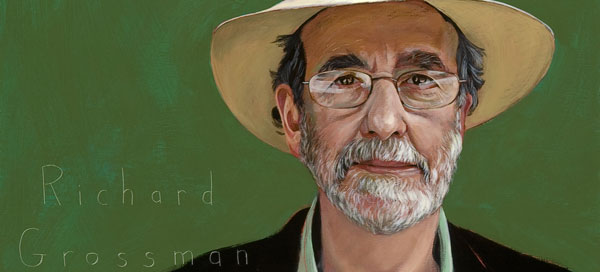Richard Grossman (1943–2011) was an American historian and activist who focused on the history and impact of corporate power in the United States. He co-founded the Program on Corporations, Law and Democracy (POCLAD), an organization that challenged the legal and political frameworks that have allowed corporations to amass vast wealth and influence.

Grossman’s 2005 talk “Corporate Law and Lore” had a profound effect on the way I understand the problem of corporate power and politics. It’s from Grossman that I gained greater confidence in describing our current situation as living under corporate state rule. His description of the corporate state emerging from the slavocracy and analysis of the eclipse of populism by progressivism helps us grasp how the new fascism came about and how it operates. I am sharing Grossman’s talk in the hope that you will watch it and push it out. Below the video, I say a bit more about Grossman and his ideas.
Grossman’s work is deeply critical of the role of corporations in American society and global politics. He argues that the current economic and legal systems are structured to favor the interests of corporations over those of people and communities. He contends that populism, the democratic politics of flesh and blood people, was trumped by progressivism, the elitist political program of corporate persons and their lawyers, developed in the late nineteenth century and institutionalized during the New Deal. As such, administrative and regulatory law are designed not to protect workers and the environment but to manage workers and environmentalists. Indeed, the imperative of the law under these conditions means that piecemeal attempts to combat the harm corporations strengthens corporate power over the people. We have to go for the underpinnings, Grossman insists. We have to reject “settled law.”
One of Grossman’s contributions to the field of corporate law is his research into the historical development of corporate power. From this work, I learned about the principle of quo warranto and the way corporate power interacted with sovereign power, whether monarchal or republican, in the past—and how sovereignty was overthrown by corporate personhood. Grossman argues that the legal framework for corporations in the United States was established in the nineteenth century to give corporations many of the same rights as individuals but without the same level of accountability or responsibility. This, he argues, has allowed corporations to exert a level of political and economic influence that undermines democracy and the safety and well being of people and other animals. See his speech on the history of corporations here:
Grossman was deeply involved in activism aimed at challenging corporate power and encouraged activists to go for the underpinnings. He was a vocal opponent of regionalization and globalization, for example in the free trade agreements like NAFTA and the World Trade Organization, which he saw as tools for further consolidating corporate power. Grossman’s work challenges the conventional wisdom that corporations are apolitical entities that simply respond to market forces. Instead, he argues that corporations are political actors in their own right, and that they have actively worked to shape public policy and regulatory frameworks to benefit their own interests. He advocates for greater democratic control over economic decision-making, including the development of alternative economic models that prioritize social and environmental justice.
Scientific studies provide empirical support for Grossman’s arguments. For example, in “Testing Theories of American Politics: Elites, Interest Groups, and Average Citizens,” published in Perspectives on Politics in 2014, Martin Gilens and Benjamin Page analyzed data on more than 1700 policy issues and found that the preferences of average citizens had a near-zero impact upon public policy compared to the impact of economic elites and organized interest groups.
